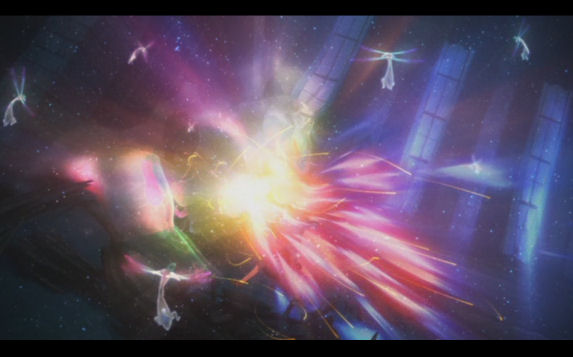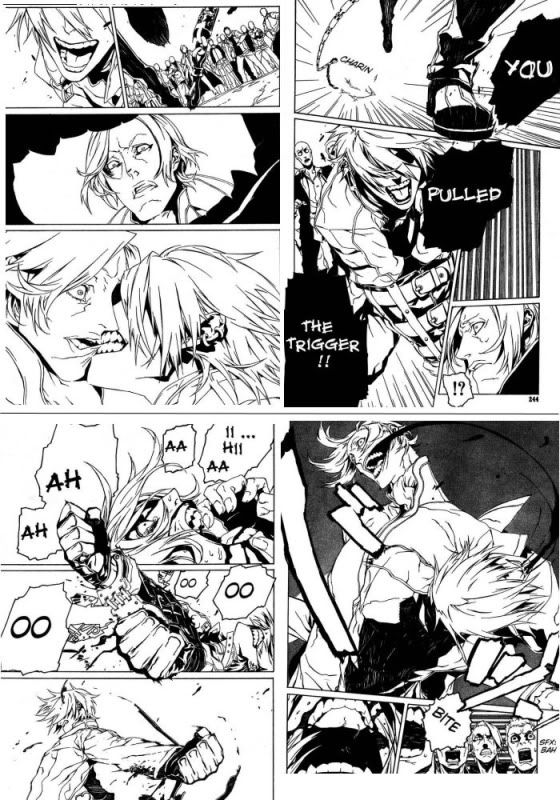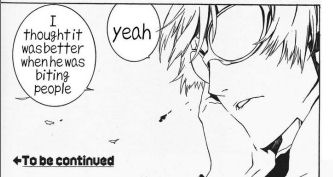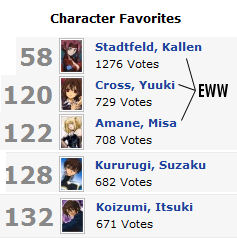
- Created By bellpickle
BE-A-TO-RI-CHE (a.k.a. Umineko no Naku Koro Ni)
EP1: The creepy mood that the show is trying to set up is rather forced at this point... This episode suffers from the same flaw Higurashi did: some of the sudden mood shifts aren't really well-executed and end up being awkward rather than unnerving. That said, this is the "set-up episode," so it's practically destined to be not-so-great. The set-up itself seems interesting enough, and I DO like the whole Ten Little Indians thing this show has got going on.
EP2-6: Ooo, it gets MUCH better. I'm def. digging the way the storyline is unfolding. Thus far, I'd say this show "feels" pretty different from Higurashi. Both involve murders and supernatural elements that appear to be behind those murders. But Umineko is more of a straight-up murder mystery (at least, so far) and has the audience wondering "Who is the REAL killer?" Whereas Higurashi relied more on sudden mood shifts and all other kinds of batshit insane, and had the audience wondering, "How is everyone going to go crazy and kill each other THIS time??"
Plus, I like that Umineko actually explains why the story repeats; I watched Higurashi at my high school's anime club and none of the other first-time viewers knew that Higurashi was based off of a visual novel, and so all of them were confused and didn't understand why the story kept repeating. I like that this one actually gives a reason for it early on.
EP7: I would slap the hell out of Maria too. She is so goddamn annoying. I swear, kids in anime are either genuinely sweet or intolerable. Her equally crazy mommy is probably supposed to draw the audience's sympathy towards her, but I def. ain't biting. That girl is fucking crazy no matter what the reason.
The Beatrice/Battler interaction really abrupts the flow of the story. (Apparently, their dialogues are a mechanism of the VN.) Hopefully it will be pulled off better in later episodes.
A lot of the talk on MAL has me VERY excited for ep8. This post in particular:
In order for Battler to win at all, however, he has to be able to explain the mysteries of EVERY board game. Meaning, the first murders will be addressed eventually by Battler, but in the meantime he's just going to be stockpiled with even more mysteries to deal with. It may seem like an endless diversion right now, but actually, the developments of this arc onwards will provide Battler with the tools/means he needs to be able to counterattack Beatrice on all of the board games.
As well as the confirmation that this next arc is NOT just a simple Answer arc or a repeat of the first arc--things are going to get a lot more interesting and difficult from here on out. (Which the above preview appears to confirm.) This is going to be pretty awesome. :D :D
Mushishi/Natsume Yuujinchou Comparison (no spoilers :P)
It's sort of a knee-jerk reaction for people to compare the above two series; I thought of Mushishi, too, when I started watching Natsume. There are a lot of superficial similarities: both are episodic, deal with otherworldly beings that are only visible to some, are highly acclaimed, etc. This sometimes leads to bitterness on both sides, as many of these comparisons eventually turn into an argument of which of the two shows is "better." However, to me, these two anime just cannot be compared in this way because both strive to achieve something completely different from the other. Most of the similarities between the two really are just "superficial." Compare the OPs to see the differences in tone: Natsume is light, vibrant, and happy, whereas Mushishi is much more quiet and reflective. More importantly, most of Natsume's themes and even the format of its episodes are completely different from Mushishi--all of which contributes to the differing "overall message" of both.
Though both heavily focus on the interaction between humans and these "otherworldly beings," the nature of those beings determines the nature of the interaction. In Mushishi, the Mushi are, for the most part, unintelligent, primitive creatures that simply exist alongside humans. Mushi are depicted as being a part of nature and are often compared to or even share the appearance of plants and animals. Conversely, the ayakashi in Natsume are anthropomorphic spirits. All ayakashi are capable of conversing and feel the same emotions humans do. Some befriend or even fall in love with humans. Though some ayakashi are barbaric and violent in nature, many are essentially humans in spirit form. In summary, the Mushi of Mushishi are akin to plants, animals, and primordial creatures--all of which are considered lesser than humans, but are accepted as part of nature. The ayakashi of Natsume are supernatural spirits that think and feel as humans do. Though both anime preach that humans should accept Mushi/ayakashi, Mushishi stresses human tolerance of and co-existence with Mushi, whereas Natsume stresses equality and friendship with ayakashi.
These differences are further stressed through the lead characters. Ginko's attitude towards Mushi can be summed as, "They do what they need to do to survive, and if feasible, shouldn't be punished for simply living." The format of each episode of Mushishi is sort of like a medical mystery show, with Ginko playing the role of the doctor: Ginko is first presented with the illness/problem, which he then diagnoses (by IDing the Mushi) and cures (by releasing or relocating the Mushi). Thus, Ginko's role in the show is more of an observer rather than an active participant (with a few exceptions); he helps when necessary, but for the most part, he is the eyes through which the audience views the world of Mushishi. On the other hand, Natsume Yuujinchou is much more of an adventure story; Natsume spends each episode helping an ayakashi (or occasionally a human) with whatever task is given to him. The tasks range from helping an ayakashi be noticed by a human they admire to helping a human escape from a curse that was placed on them by a powerful youkai. Along the way, Natsume often grows to care about his "clients" so much that he throws himself headfirst into life-threatening situations in order to protect them. (Ginko, on the other hand, usually finds himself somehow dragged into life-threatening situations.) And unlike Ginko, who has already come to terms with Mushi by the start of the show, Natsume matures considerably throughout the course of the story and grows to accept ayakashi as an important part of his life by the end. Whereas Ginko is the observer, Natsume is much more of a "hero." (Albeit a considerably weak one.)
The various stories of both Mushishi and Natsume are essentially tales of human nature. Mushishi depicts human nature through humans' actions and reactions towards situations involving the Mushi. (e.g. humans shunning humans who have been afflicted by a Mushi in some way, or conversely, humans accepting those afflicted humans) Natsume Yuujinchou depicts human nature through the protagonist and his relationships with the ayakashi. (As stated previously, the ayakashi are basically humans themselves.) Ginko accumulates knowledge as he travels and encounters different kinds of Mushi and the people affected by them. Natsume's journey is much more personal; even though his childhood was terrible at the fault of both humans and ayakashi, he learns to love both equally and accepts both worlds as important parts of his life. In the end, Mushishi is a collection of stories about humans trying to live in harmonious co-existence with the creatures known as Mushi, whereas Natsume Yuujinchou is about the personal development of the main character, as well as the friendships he forms with various ayakashi.
This is why I get miffed by statements like "Mushishi is a better Natsume Yuujinchou," or conversely, "Natsume Yuujinchou is what Mushishi should've been." The two shows accomplished completely different things; the two are definitely not interchangeable and it greatly undermines the integrity of both series to suggest that one is simply a better version of the other, no matter what your preference is.
That said, I have immense respect for both series, even though Natsume Yuujinchou wins out as my personal favorite. :)
EDIT:
Here is the short-but-sweet AMV that convinced me to FINALLY finish watching Mushishi after putting it on-hold for three-ish years. And wow, this is.... almost publish-worthy, isn't it? I guess I've def. filled up my weekly analysis quota. ^^;;
Kara no Kyoukai 6
Just had to post these screencaps before heading to bed:



^The big fight scene of the movie. Needless to say, it's extraordinary-looking.

And the preview for Kara no Kyoukai 7 is one of the creepiest things ever, and also contains the best flesh-eating sounds and animation of recent memory. (What an interesting compliment.) I absolutely cannot wait! :DDDD
things that are fucking awesome, bell loves violent shit, the strait jacket makes it cooler, etc.
and yes, read: left <----- right

. . . . . .

Code Geass R2 (cont.)
Oh, Code Geass! This show that's ostensibly about liberating the Japanese, but is really about Lelouch's personal revenge, until Lelouch appears to go EVIL BATSHIT and the goal levels up to CREATING A NEW WORLD. If Natsume Yuujinchou is the little engine that could, then Code Geass is one of those huge, honking, black bile-spouting locomotives that are so massive that that damn hill looks like it will just collapse under its weight--and almost does.
That ending actually wasn't as terrible as I was expecting; I think if you go into these types of things with laughably low expectations, you're more likely to come out surprisingly entertained. Also lol@Lelouch's dramatic, blood-smearing death fall. I hope my death will be half as cool as that. xD
Although I DID make the =___=;; face a lot when the show kept being all: Oh no, we killed someone off! *five minutes later* J/K LOL. And biggest eww moment goes to THAT Lelouch/Kallen scene. DIE, PAIRING, DIE.
My final verdict:

Screw the ending, THERE IS NO JUSTICE IN THIS WORLD.